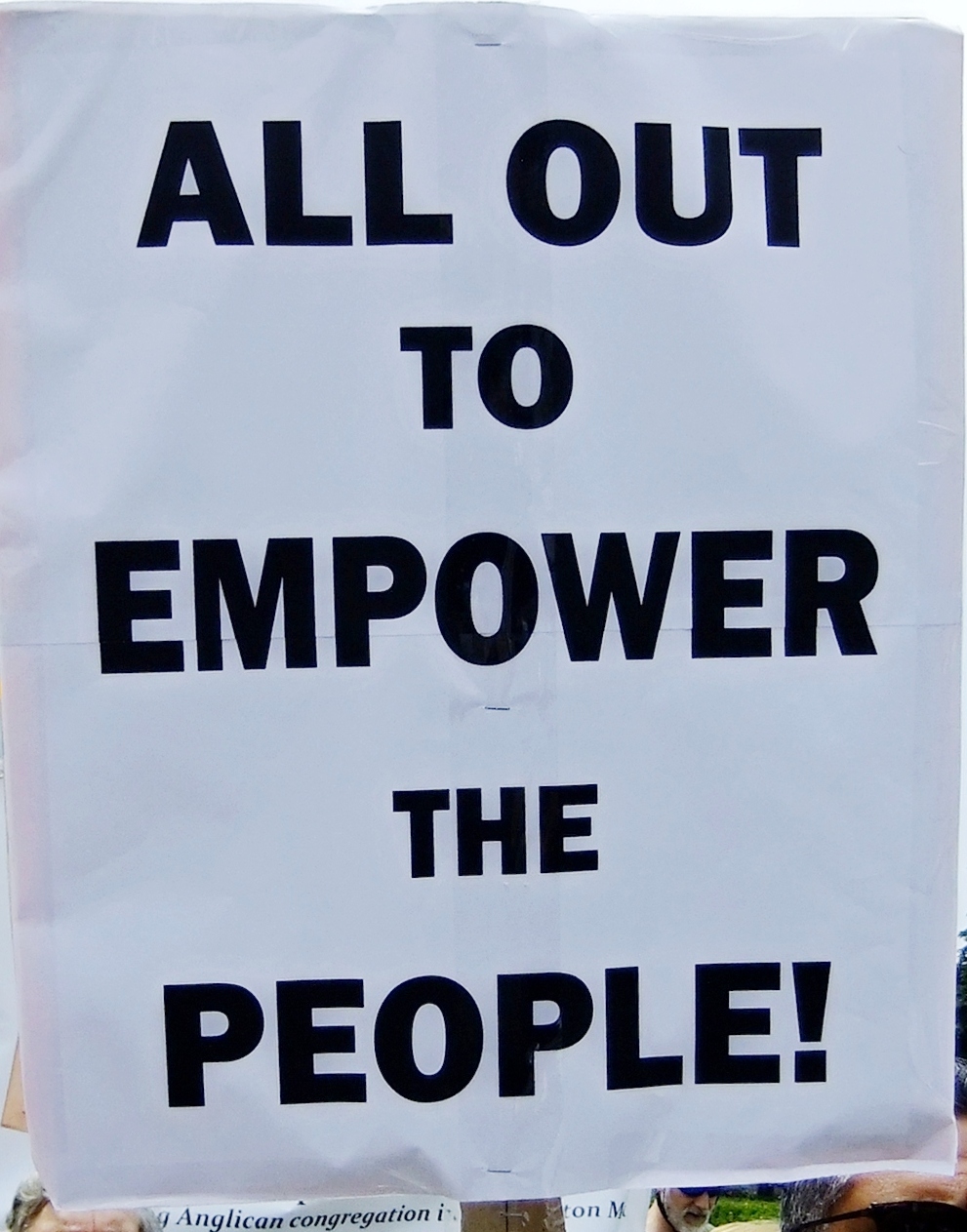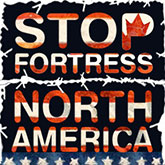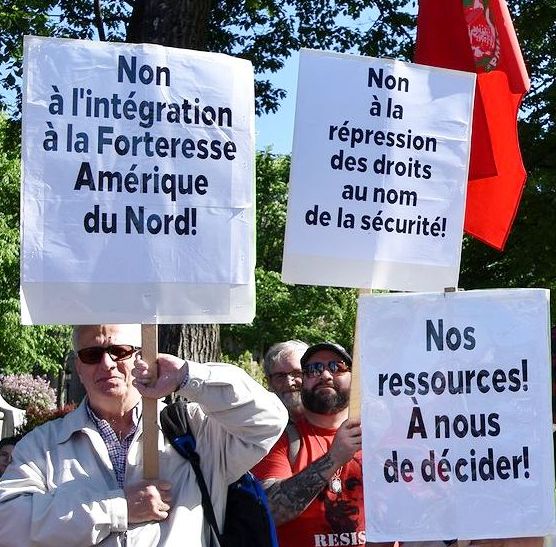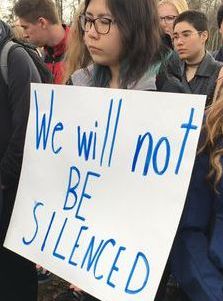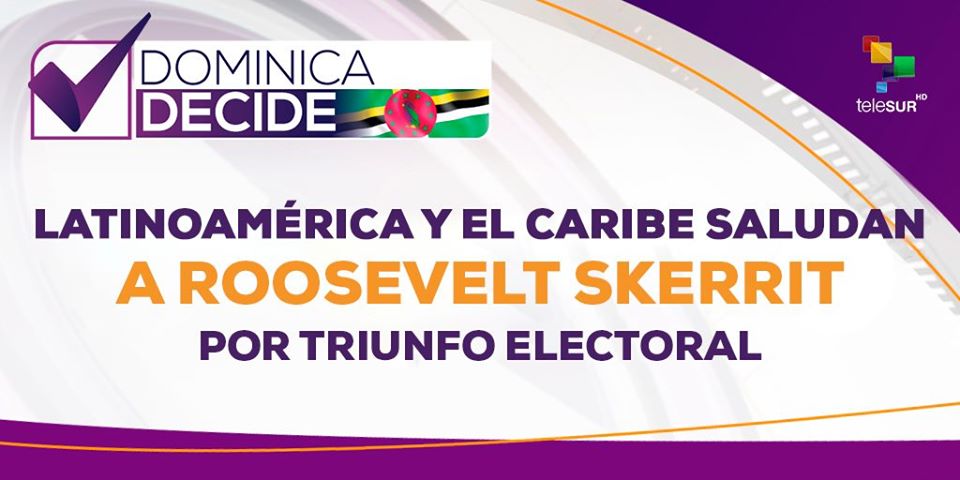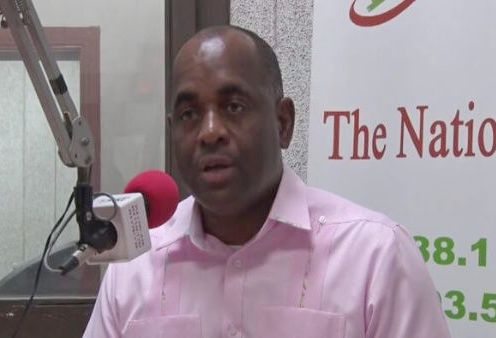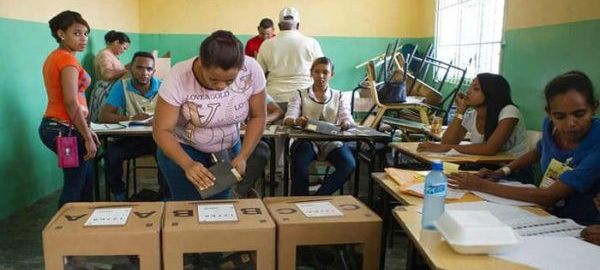
|
December 14, 2019 - No. 31 Financial
Oligarchy Strengthens |
|
|
The use of CUSMA as a weapon in the deepening civil war between factions of the financial oligarchy shows how Canada and Mexico are being drawn into the U.S. political infighting through their integration into Fortress North America. Former President Obama made this clear as well when he directly intervened in the recent Canadian federal election with his loud and public endorsement of Trudeau. President Trump, with obvious contempt, later denounced Canada as "slightly delinquent" in its defence spending and Trudeau as "two-faced."
CUSMA confirms politically the economic domination of a financial oligarchy and its private enterprises over all three economies in North America and the negation of national sovereignty. CUSMA makes official the control of the financial oligarchy over Fortress North America as a base for its striving for hegemony over the entire world.
Canadians should ask themselves what problem CUSMA solves. The agreement blocks the people taking action to solve problems as they pose themselves in any sector, region or sovereign country. In fact, CUSMA prohibits the people from raising any issue in the economy, either socially or politically, that may infringe on the right of the financial oligarchy to pursue its aim of maximum private profit.
The U.S. President uses "national security" to impose tariffs on Canada and Mexico contrary to existing arrangements, when this suits the financial oligarchy. The U.S. considers that its right to attack Canadian softwood lumber, steel and aluminum etc. goes without saying. The right of the financial oligarchy to close factories such as the GM plant in Oshawa, and stores such as RONA and Sears, and destroy entire sectors is sacrosanct because the private property rights of the rich oligarchs are sacred and enshrined in both the old and new NAFTA and affirmed in practice. This and CUSMA reveal a situation where anarchy and violence prevail and "might makes right" is the ruling dictum, where those with the greatest social wealth control all aspects of life and the people must obey.
CUSMA marks another step in the integration of Canada and Mexico into Fortress North America under the rule of the financial oligarchy and the massive U.S. Military, intelligence agencies and Homeland Security.
 The mass media
hype for CUSMA, and promotion of
certain
political figures associated with it, reveal that the agenda,
concerns and rule of the financial oligarchy are in opposition to
the agenda, concerns and rule of the peoples of North America and
their desire for democratic renewal and empowerment. The rule,
outlook and aim of the financial oligarchy are imposed on the
people with the force of constant repetition and exclusion of all
alternatives. In the face of the media hype promoting the
suffocating anti-social agenda of the financial oligarchy and its
political representatives in the cartel parties, the people have
to strengthen their independent politics, organizations,
thinking, agenda and media.
The mass media
hype for CUSMA, and promotion of
certain
political figures associated with it, reveal that the agenda,
concerns and rule of the financial oligarchy are in opposition to
the agenda, concerns and rule of the peoples of North America and
their desire for democratic renewal and empowerment. The rule,
outlook and aim of the financial oligarchy are imposed on the
people with the force of constant repetition and exclusion of all
alternatives. In the face of the media hype promoting the
suffocating anti-social agenda of the financial oligarchy and its
political representatives in the cartel parties, the people have
to strengthen their independent politics, organizations,
thinking, agenda and media.
The people did not decide to have CUSMA and Fortress North America and that is the problem. The financial oligarchy deprives the people of their right to decide and control those affairs that affect their lives. Without control, the people are deprived of the right to decide and take action to solve the problems as they pose themselves. Without control, the nations are deprived of their sovereignty and become embroiled in the dogfights of the financial oligarchy and its striving for global domination.
CUSMA represents the negation of the right of the people to decide and should be soundly denounced and opposed.
Organize for Democratic
Renewal and the Empowerment of the People
to
Affirm Their Right to Decide!
All Out to Build the New!
(Photos: TMLW, F. Zuccarella)
Salient Features and Discussion of Proposed Canada-U.S.-Mexico Agreement
The Canada-U.S.-Mexico Agreement (CUSMA) to supplant the current North American Free Trade Agreement (NAFTA) was signed by the three respective government representatives on November 30, 2018 and signed again on December 10, 2019 after certain changes were included. The governments of the three countries must officially pass CUSMA into legislation for it to come into effect. Meanwhile NAFTA remains in force. NAFTA was signed in 1992 by the leaders of the U.S., Mexico and Canada, and activated on January 1, 1994.
The official stated goal of NAFTA, which was used for propaganda purposes to push the anti-social offensive, was to grant each country the best possible tariffs on certain goods -- an arrangement called Most-Favoured-Nation status, eliminate trade barriers and facilitate the trade of goods and services, promote fair competition, increase investment opportunities, and ultimately, establish a framework for future cooperation regarding trade among the three countries.
The resulting reality was to accelerate a trend already evident: the integration of the economies of North America into a Fortress under the control and direction of the most dominant factions of the ruling financial oligarchy and their conglomerates and cartels. The control of the ruling oligarchs is so extensive they have politicized their private interests and integrated them with the government and state. Most regulations and restrictions on the operations and investments of big business have been removed, watered down, ignored or slated for elimination.
This means that the power of government consists mainly of channeling publicly collected social wealth to various factions of the financial oligarchy, restricting the actions of the working class in defence of its interests and using the combined military, human and natural resources and produced social wealth of Fortress North America in war and other actions to attain hegemony over the entire world.
The direct power of the financial oligarchy aligned with the U.S. imperialists, over the economic, political, military and social affairs of North America and their striving for global hegemony drives the changes to NAFTA to create CUSMA. The World Trade Organization (WTO) and its dispute resolution mechanism, for example, is also being superceded, as it puts fetters on the ability of the U.S. imperialists to do as they please. Similarly, the principles of international relations to uphold peace that the United Nations is supposed to embody and uphold have been systematically undermined.
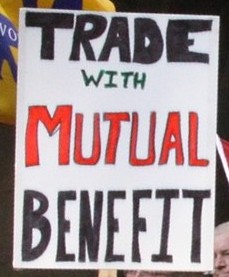 The politicized
private interests of the financial
oligarchy
mean anarchy and violence on a global scale without an
international business law to keep competitors from destroying or
killing each other. In some ways, politicized private interests
reflect the lawlessness of the Wild West on a global scale. The
arbitrariness of politicized private interests is seen with
President Trump wielding tariffs as weapons to gain advantages
over China and others identified as hostile competitors, and
imposing sanctions and boycotts on any country that does not
submit to U.S. domination.
The politicized
private interests of the financial
oligarchy
mean anarchy and violence on a global scale without an
international business law to keep competitors from destroying or
killing each other. In some ways, politicized private interests
reflect the lawlessness of the Wild West on a global scale. The
arbitrariness of politicized private interests is seen with
President Trump wielding tariffs as weapons to gain advantages
over China and others identified as hostile competitors, and
imposing sanctions and boycotts on any country that does not
submit to U.S. domination.
The softwood lumber tariffs attacking Canadian production and sales in the United States are but one example. The tariffs are seen as an advantage for the private interests of the big softwood producers as retail prices have increased exponentially. The five biggest so-called Canadian softwood lumber producers have profited from the higher prices, shut mills in Canada and invested heavily in the United States and Europe.
However, the conditions for agreements such as CUSMA and bodies such as the WTO to provide order or sort out contradictions no longer exist. Anarchy and violence in international relations and the dictate of supranational powers prevails. Under such conditions of anarchy and violence, adherence to rules to enforce agreements and arrangements no longer exists, except in circumstances where a powerful faction of the financial oligarchy may want to opportunistically use them. Needless to say, the time has arrived for a new direction for the economy that favours the working class of all three countries in North America, restricts the activities of the financial oligarchy and takes actions to eliminate the anarchy and violence that now prevails in international relations.
Proposed Changes from NAFTA to
CUSMA, Including
December 2019 Revisions
Attack on Canadian Farmers
 The
financial oligarchy is particularly keen on eliminating Canada's and
Quebec's traditional supply management in the dairy sector. Farmers
have waged a determined struggle to defend their rights within a
sovereign Canada and its economy. By granting tariff-free access to the
Canadian dairy market for the other two countries and vice versa, CUSMA
seeks to destroy farmers' sovereign right to organize their sector. The
U.S. agricultural sector is well-known for its dominance in size of
operations and integration with the financial oligarchy. The
conglomerates in the sector will be able to sell below prices of
production to wipe out competitors in the dairy sector as they have
done in the United States.[1]
The
financial oligarchy is particularly keen on eliminating Canada's and
Quebec's traditional supply management in the dairy sector. Farmers
have waged a determined struggle to defend their rights within a
sovereign Canada and its economy. By granting tariff-free access to the
Canadian dairy market for the other two countries and vice versa, CUSMA
seeks to destroy farmers' sovereign right to organize their sector. The
U.S. agricultural sector is well-known for its dominance in size of
operations and integration with the financial oligarchy. The
conglomerates in the sector will be able to sell below prices of
production to wipe out competitors in the dairy sector as they have
done in the United States.[1]
Vehicle Industry
In 1965, the big three vehicle producers at the time (Ford, GM and Chrysler) established a state-organized cartel with the Canada-United States Automotive Products Agreement. The auto pact effectively integrated the U.S.-Canada vehicle industry under the control of the big three U.S. monopolies and various auto parts manufacturers. For the auto cartel, trade between Canada and the U.S. became mostly an internal tariff-free movement of products within the production process that became known as "just in time."
In most sectors, including energy, internal trade among the divisions of giant, mostly U.S.-controlled private enterprises, with goods moving between Canada and the U.S., became a dominant feature of Canada's integration into the U.S. economy during the later decades of the twentieth century. Canada does not trade with the U.S. as a sovereign country in control of its economic affairs but as a captured and integrated economy within Fortress North America dominated by a financial oligarchy.
With the auto pact, the vehicle cartel gained access to an educated, healthy and disciplined Canadian human productive force. Two important social programs made the price of the capacity to work of Canadians cheaper than workers in the United States: the Canadian National Health Insurance Program and Unemployment Insurance (UI) now called Employment Insurance. The U.S. auto monopolies did not have to pay for private health insurance for their workers in Canada as they did in the U.S., and could organize irregular large layoffs with workers receiving UI payments almost equivalent to their regular pay. This meant workers remained in touch as experienced on-call autoworkers even during extended layoffs.[2]
With the gradual extension of the auto sector worldwide in the final decades of the twentieth century, including large global investments in auto production in East Asia, the auto pact lost its relevance for the financial oligarchy and in fact became an irritant for the surging Japanese and south Korean producers who had extensive connections with big investors in the United States. The U.S.-Canada Free Trade Agreement and NAFTA in 1994 replaced the auto pact, integrating all auto production in North America beyond the original big three as tariff free.
The uneven
development of imperialism, changes in production
technique and a rapid increase in international transportation of
goods via ships have seen vehicle production expand in importance
in Asia and Mexico and decline in the U.S. and Canada. NAFTA
subsequently lost its relevance on this front.
The financial oligarchy always seeks to strengthen its control in opposition to its competitors and the working class. Under its control and to favour the private interests of the oligarchs, the U.S. and Canadian vehicle sector is undergoing radical change with autoworkers bearing the burden of permanent job losses with little prospect of similar employment. Communities such as Oshawa, Oakville, Windsor and many in the U.S., are suffering grave consequences as their economies shrink. The proposed changes within CUSMA regarding vehicles are meant to favour the financial oligarchy while the working class is under attack, has no say or control over what is happening in their lives and economy, and has certainly not given its consent.
Under CUSMA, to receive tariff-free status within the North American market, a minimum of 75 per cent of the price of production of a vehicle must have been generated within Fortress North America. This brings no guarantee that production will continue in plants already established, as those in control are rapidly introducing new production technique and shifting production sites according to their narrow private interests, outlook and criteria. The aims of those in control do not include ensuring the well-being of the human factor, nor the development of a diverse sustainable economy to ease the burden from the introduction of new technique and moving away from the car culture and its environmental pollution and other negative factors.
CUSMA seeks to standardize the price paid for the capacity to work for North American autoworkers at $16 per hour, which is well below the current price in the U.S. and Canada. With this manoeuvre, CUSMA seeks to eliminate the auto trade unions as independent organizations of the working class, which bargain collectively with the financial oligarchy for terms of employment acceptable to autoworkers themselves in the three countries.
Mexico has agreed to establish new bilateral mechanisms with both the U.S. and Canada to allow direct interference in its relations of production in the auto sector, and to further integrate its economy into Fortress North America under the control of the financial oligarchy. A Government of Canada press release detailing the changes finalized in December says, "Under the dispute settlement chapter of CUSMA with respect to specific labour obligations [... a] facility-specific rapid-response mechanism will provide Canada with an enhanced process to ensure the effective implementation of specific labour obligations in covered facilities. If a signatory has concerns [...] it can request an investigation by an independent panel of labour experts and, subject to a positive finding, it can take measures to impose penalties on exports from those facilitates."
Rules on Steel and None for Aluminum
The CUSMA automotive rules of origin contain a requirement that 70 per cent of the steel purchased by vehicle assemblers must qualify as originating in the CUSMA region. The revised new NAFTA calls for rules on steel to be implemented over seven years.
No such rule is included for aluminum. The Canadian delegation had reportedly been pushing a requirement that a certain percentage of aluminum used in autos should be smelted in North America but the U.S. and Mexico refused to agree. Canada is by far the largest producer of aluminum within Fortress North America. The oligopolies in control of aluminum production have facilities throughout the world and use their global production to attack workers in Quebec and BC and to demand concessions from governments on the price of electricity, which is a major factor in production.
The lack of any agreement on rules of origin for aluminum may be a sticking point when CUSMA arrives to be ratified in the Canadian Parliament. The Bloc Québécois has already indicated its disappointment with this deficiency in the agreement.
"Intellectual Property"
Government Abdicates Its Social Responsibilities
CUSMA includes regulatory cooperation provisions that limit each government's ability to regulate the production and sale of goods in fields such as chemicals, food safety, and the environment. This directly benefits the conglomerates of the financial oligarchy as governments are left with little power to control what is produced and sold within North America.
CUSMA gives the financial oligarchy extraordinary power to control regulations covering all manner of economic affairs, negating the government's ability to fulfil its social responsibilities. Under CUSMA, governments must allow big business to review any proposed regulations governing their particular sector or industry in advance of their enactment. In effect, this politicizes the private interests and activities of the conglomerates of the financial oligarchy in very specific ways.
Also explicitly, no public participation or oversight is allowed in shaping regulations. CUSMA gives corporations advance notice of new regulations. So-called interested persons are notified in advance of planned government regulations and are allowed a consultation process before any regulation proceeds to legislation.
 All regulations
are required to be "science based." The
politics of nation-building are not considered "science based"
under the imperialist definition nor are social or other
considerations to deal with problems and challenges such as
poverty, climate change, regional development or the imperialist
tendency towards a war economy and the necessity to make Canada a
zone for peace. The conglomerates can reject regulations they
consider non-"science based."
All regulations
are required to be "science based." The
politics of nation-building are not considered "science based"
under the imperialist definition nor are social or other
considerations to deal with problems and challenges such as
poverty, climate change, regional development or the imperialist
tendency towards a war economy and the necessity to make Canada a
zone for peace. The conglomerates can reject regulations they
consider non-"science based."
The government must prove a proposed regulation is backed by science while the private interests of the conglomerates do not have to prove their production or other activities are not harmful to the collective life of the nation, the well-being of the people or health of Mother Earth. CUSMA overturns the "precautionary principle" of civil society whereby private interests were supposed to prove their activities would cause no harm to the common good. In precluding the precautionary principle, CUSMA puts the burden on those shaping regulations to defend their rules when challenged by powerful private interests.
Under CUSMA, the Council of Canadians notes, "Regulators have to vigorously defend proposed regulations and are even required to suggest alternatives that don't involve regulating. They have to provide extensive analysis, including cost-benefits to industry."
In practice, under civil society, the precautionary principle often proved a fraud when confronted with the private interests of the financial oligarchy, where social responsibility for consequences are ignored and evidence suppressed. Examples are numerous, such as with big tobacco and the health risks from smoking; the car culture and the attendant slaughter on the roads, congestion and air pollution; the energy sector and pollution leading to climate change; big pharma and the pushing of opiates resulting in addiction and mass deaths; and the use of violence to settle differences in international relations expanding the war economy, which in turn promotes the sale and use of its produced weapons.
Standardizing Regulations
CUSMA insists the three countries harmonize regulations or at least have similar ones. Many commentators remark that this standardization will bring standards down to the lowest common denominator and deny any independence of action according to the concrete conditions within the three countries.
Corporations can contest regulations in one country if they are not standard or similar to regulations of either one or both of the others. This regulatory cooperation is subject to dispute resolution, meaning the big corporations can directly challenge government actions before a non-government agency.
CUSMA allows, and in some ways encourages, the conglomerates of the financial oligarchy to defend their private interests and push for changes in regulations dealing with such issues as genetically modified organisms, glyphosates such as Monsanto/Bayer's Roundup herbicide, health and cigarette labelling, rules on food inspections and those dealing generally with public safety. Much of this activity would be carried out in private behind closed doors.
Dispute Resolution
The NAFTA Chapter 19, the anti-dumping/countervailing duty dispute resolution mechanism, and Chapter 20, country-to-country dispute resolution mechanism, are maintained. Many consider that both these mechanisms infringe on the sovereign right of nations to regulate imports, as they hand over resolution of disputes to a non-government panel. In keeping with most free trade agreements, such mechanisms create a supranational body to deal with complaints. The U.S. has long opposed their use and in fact has scaled back Chapter 19 in a side agreement with Mexico. The only significant use of Chapter 19 saw Canada challenge softwood lumber duties. Although Canada won the case within the panel, the U.S. authorities simply came back with new tariffs and arguments.
The U.S. financial oligarchy opposes these panels as they infringe on their private power. It currently is waging a fight to eliminate the WTO dispute settlement process by blocking appointments and reappointments of judges. Because three judges are needed on each appeal, the system looks set to break down when two judges' terms expire in December 2019.
Similarly with NAFTA Chapter 20, the U.S. authorities have blocked its use since 2000 when they refused to appoint members to a panel to deal with a Mexican complaint of U.S. tariffs on its sugar. No NAFTA Chapter 20 panel has been established since then.
In an apparent contradiction with the retention of Chapters 19 and 20, CUSMA eliminates NAFTA Chapter 11, the investor-state dispute resolution mechanism between Canada and the United States (ISDS) but maintains it for certain instances between the United States and Mexico. The elimination of Chapter 11 has been hailed by some as a popular victory but closer examination suggests it has become irrelevant in the face of the broadening of the supranational powers of the financial oligarchy within Fortress North America.
The ISDS was a mechanism that allowed private corporations to take legal action against a foreign government if it believed that a foreign government's policies infringed on the corporation's rights to engage in commerce in that country in accordance with the terms of NAFTA. With the standardization of regulations and other powers the financial oligarchy can force its way in most instances unless the people mount a determined resistance. The oligarchs may feel that ISDS had become a lightning rod for opposition and more trouble than it's worth. Besides, the neo-liberals are able to portray its demise as a victory for the people and sovereignty and a centrepiece of the new NAFTA.
Restrictions on Negotiations with a
Designated
"Non-Market Country"
CUSMA states, "At least three months prior to commencing negotiations, a Party shall inform the other Parties of its intention to commence free trade agreement negotiations with a non-market country. For purposes of this Article, a non-market country is a country that on the date of signature of this agreement at least one Party has determined to be a non-market economy for purposes of its trade remedy laws and is a country with which no Party has a free trade agreement...
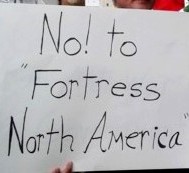 "Entry by any
Party into a free trade agreement with a
non-market country, shall allow the other Parties to terminate
this Agreement on six-month notice and replace this Agreement
with an agreement as between them (bilateral agreement)."
"Entry by any
Party into a free trade agreement with a
non-market country, shall allow the other Parties to terminate
this Agreement on six-month notice and replace this Agreement
with an agreement as between them (bilateral agreement)."
The Canadian Press, at the time of the public release of the contents of the CUSMA, reported Conservative MP Michael Chong accused the Liberal government of giving up a significant degree of sovereignty in the deal. "We now have to ask for Washington's permission to enter into trade negotiations with certain countries that the U.S will designate as non-market countries," Chong said. "It literally makes us a vassal state of the Americans."
In an interview with Reuters, U.S. Commerce Secretary Wilbur Ross defended the non-market clause within CUSMA calling it a "poison pill provision to deter deals with China." Ross said the clause tries "to close loopholes in trade agreements that have served to legitimize China's trade, intellectual property and industrial subsidy practices."[4]
Sunset Clause
Section 232 Tariffs
In March 2018, the United States imposed tariffs of 25 per cent on imported steel and 10 per cent on imported aluminum under Section 232 of the Trade Expansion Act of 1962, which allows the U.S. President to impose tariffs on the grounds of national security. President Trump reportedly used the tariffs to extort certain features within CUSMA that his faction wanted. The Section 232 tariffs on Canadian and Mexican produced steel and aluminum were eventually withdrawn.
Also being considered under Section 232 are tariffs of 25 per cent on all auto imports. The CUSMA provides side letters stating that if the U.S. were to impose tariffs on automobile imports, Canada and Mexico would have a two-month tariff-free period to make alternate arrangements.
Section 232 tariffs and the softwood lumber tariffs are examples of how relations within Fortress North America and beyond are precarious and uncertain, one could even say lawless, and subject to the pragmatic demands of competing factions of the financial oligarchy and their fight for control of the U.S. Presidency.
Online Purchases and Movement of Data
CUSMA increases the duty-free limit for Canadians purchasing U.S. goods online from $20 to $150.
CUSMA allows companies to transfer data across borders without encountering barriers. In an Associated Press report, Jason Oxman, president of the tech trade group ITI, said the pact's digital provisions set "a new and important precedent for modern trade rules." The details in the pact do not clarify the significance of these "modern trade rules" for data or what this means for Canadians, for example, in the realm of privacy or politics.
Background on NAFTA and Its Renegotiation
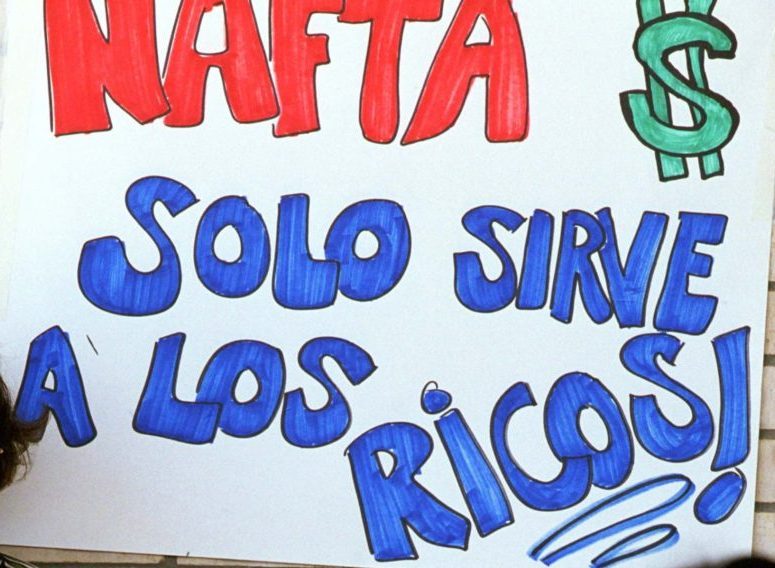 The North
American Free Trade Agreement (NAFTA) went into
effect on January 1, 1994. Since then, trade between the three
nations has grown exponentially due in part to the establishment
of continental supply chains of the largest conglomerates. Each
day, the United States conducts more than U.S.$3.6 billion in trade
with Canada and Mexico. The combined annual GDP of Fortress North
America is more than U.S.$22 trillion.
The North
American Free Trade Agreement (NAFTA) went into
effect on January 1, 1994. Since then, trade between the three
nations has grown exponentially due in part to the establishment
of continental supply chains of the largest conglomerates. Each
day, the United States conducts more than U.S.$3.6 billion in trade
with Canada and Mexico. The combined annual GDP of Fortress North
America is more than U.S.$22 trillion.
NAFTA has allowed the financial oligarchy to move its enterprises wherever it suits their narrow private interests and where public funds and infrastructure are most generously offered in pay-the-rich schemes. Advances in production and transportation technique have been introduced to benefit the financial oligarchy without consideration for the well-being of the working class, the stability and security of the national and regional economies, or the negative consequences on the social and natural environment.
Enterprises of the financial oligarchy have established networks of manufacturers, vendors, suppliers and distributors that rely heavily on the free movement of goods across North America's borders. Transportation corridors to this effect are being considered to maximize the advantages and profits for the oligarchs.
CUSMA focuses on what the U.S. administration calls modernization in areas of intellectual property rights, regulatory practices, workers, the environment, government procurement and a number of other key areas.
Notes
1. Supply management is a system in which the Canadian government provides licences that allow farmers certain production quotas of dairy, poultry and eggs. It also controls the price of imports into Canada of those commodities. This process guarantees a sustainable living for farmers and ensures that small local farms are not flooded by agriculture produce from mega farms in the U.S. and Europe.
The changes in the new NAFTA will lead to an influx of agricultural products from the U.S., including U.S. dairy that may come from cows that have been injected with genetically engineered recombinant bovine growth hormone (rBGH) to increase their milk production. No labelling requirements for milk coming from rBGH cows are currently in existence, so consumers will not know what they are drinking.
The U.S. industrialized farming industry is heavily subsidized from public funds and integrated with the financial oligarchy. Allowing more market access for U.S. corporate farms would mean Canadian small farmers would be in competition with much bigger producers capable of manipulating prices to their advantage.
"The Council of Canadians opposes ratification of a new NAFTA that erodes our supply management system and puts our food sovereignty at risk."
With files and direct quotation from here.
2. "In 1964, only seven per cent of vehicles made in Canada were sent south of the border, but by 1968 (with the introduction of the auto pact in 1965), the figure was 60 per cent. By the same date, 40 per cent of cars purchased in Canada were made in the United States. Automobile and parts production soon surpassed pulp and paper to become Canada's largest industry. From 1965 to 1982, Canada's total automotive trade deficit with the U.S. was $12.1 billion; this combined a surplus of around $28 billion worth of assembled vehicles and a deficit of around $40.5 billion in auto parts...
"The jobs created by the new market conditions under the auto pact were almost exclusively blue collar; administration, research and development remained in the United States. This transfer of control of Canadian automaking operations to their U.S. parent corporations substantially reduced the autonomy of the Canadian operations with respect to vehicle and component specification, design, and sourcing, manufacturing and production, branding and marketing, and corporate policy. ...
"The agreement also prevented Canada pursuing free trade in automobiles elsewhere internationally, and this North American exclusivity led Transport Canada to adopt the Federal Motor Vehicle Safety Standards (FMVSS) of the U.S. National Highway Traffic Safety Administration rather than participating in the European-based development of international consensus on auto safety and emissions regulations...
"The Auto Pact was abolished in 2001 after a WTO ruling declared it illegal, though by that time the North American Free Trade Agreement had effectively superseded it." (Wikipedia)
"In 1966, Canadian vehicle and parts exports to the U.S. totalled $886 million. In 1977, exports were $9.9 billion. Similarly, Canadian imports from the U.S. grew from $1.5 billion in 1966 to $10.9 billion in 1977.
"Overall, the Auto Pact achieved its goal of an integrated Canada-U.S. production network. In 1965, Canada exported 48,000 vehicles to the United States, representing just six per cent of Canadian production while the U.S. exported just 64,000 vehicles to Canada, or just 0.6 per cent of U.S. production of North American type vehicles. A decade later, in 1975, Canada exported 849,000 vehicles to the U.S., representing 59 per cent of Canadian production while the U.S. exported 698,000 vehicles to Canada, representing eight per cent of U.S. production." (The Canadian Encyclopedia)
Note that the overall growth in production of vehicles must be assessed in light of the enormous promotion of the car culture in films and TV, especially among the youth. This pressure on people to use and buy cars included urban design in the largest cities that forced many working people to buy cars to travel to work and for recreation.
3. The new NAFTA gives U.S. Big Pharma confirmation of the existing length of their patents, which in Canada is eight years of exclusivity. The deal includes biologics, a new class of drugs made out of human or animal tissue. Biologics include drugs such as insulin, and drugs that treat cancer, rheumatoid arthritis, Crohn's disease and ulcerative colitis.
In 2016, Canadians spent $30 billion to fill more than 600 million prescriptions. Canadians already pay the second highest costs of OECD countries for prescription drugs. Studies have found that many people cannot afford the medications they are prescribed.
(With files from the Council of Canadians)
4. Text of CUSMA Article 32.10: Non-Market Country FTA
"1. At least three months prior to commencing negotiations, a Party shall inform the other Parties of its intention to commence free trade agreement negotiations with a non-market country. For purposes of this Article, a non-market country is a country that on the date of signature of this agreement at least one Party has determined to be a non-market economy for purposes of its trade remedy laws and is a country with which no Party has a free trade agreement.
"2. Upon request, the Party shall provide as much information as possible regarding the objectives for those negotiations.
"3. As early as possible, and no later than 30 days before the date of signature, that Party shall provide the other Parties with an opportunity to review the full text of the agreement, including any annexes and side instruments, in order for the Parties to be able to review the agreement and assess its potential impact on this Agreement. If the Party involved requests that the text be treated as confidential, the other Parties shall maintain the confidentiality of the text.
"4. Entry by any Party into a free trade agreement with a non-market country, shall allow the other Parties to terminate this Agreement on six-month notice and replace this Agreement with an agreement as between them (bilateral agreement).
"5. The bilateral agreement shall be comprised of all the provisions of this Agreement, except those provisions the relevant Parties decide are not applicable as between them.
"6. The relevant Parties shall utilize the six-month notice period to review the Agreement and determine whether any amendments should be made in order to ensure the proper operation of the bilateral agreement.
"7. The bilateral agreement enters into force 60
days after
the date on which the parties to the bilateral agreement have
notified each other that they have completed their respective
applicable legal procedures."
(Photos: TML, J. Raedle, B. Proulx)
Challenges to Ontario Government's Anti-Social Agenda
Court Rules Government Violated Autonomy of
Post-Secondary
Institutions
 Demonstration in Toronto, January
18, 2019, opposing cuts to OSAP and
the
Demonstration in Toronto, January
18, 2019, opposing cuts to OSAP and
the
Student Choice Initiative.
On November 21, Justices Sachs, Corbett and Favreau of the Divisional Court of Ontario's Superior Court of Justice ruled against the Ontario government's Student Choice Initiative (SCI). The SCI made certain public funding to post-secondary institutions conditional upon the institution making membership fees in students' unions and some ancillary fees for services these unions provide optional (i.e. students can opt out of paying them), while arbitrarily defining other student ancillary fees as mandatory.[1] The Justices ruled that the government's initiative violated both the autonomy of universities and the Ontario Colleges of Applied Arts and Technology Act and went beyond the government's prerogative powers. The case against the government was brought forward by the Canadian Federation of Students and the York Federation of Students. Intervening in the case in favour of the students' unions was the University of Toronto Graduate Students' Union, while intervening in support of the government's directives was B'nai Brith Canada, a Jewish advocacy group and "staunch defender of the state of Israel."
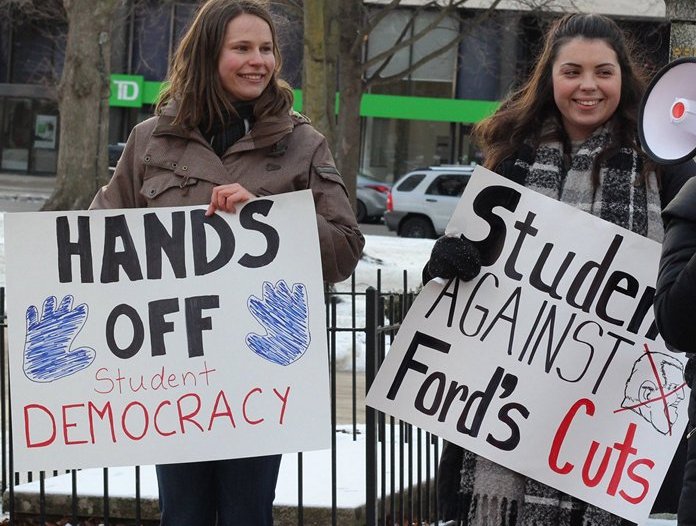 The government
claimed that the purpose of its initiative,
which came alongside a phony 10 per cent tuition reduction and
cuts to student loans, was to improve affordability and access to
publicly-assisted universities and colleges. The government
further argued that its directives were based on "core policy
decisions" made by Cabinet, and that "they are therefore beyond
the scope of the court's jurisdiction to review." It also argued
that the directives were made pursuant to the Crown's prerogative
spending power and that the court has no jurisdiction to
interfere with government spending decisions.
The government
claimed that the purpose of its initiative,
which came alongside a phony 10 per cent tuition reduction and
cuts to student loans, was to improve affordability and access to
publicly-assisted universities and colleges. The government
further argued that its directives were based on "core policy
decisions" made by Cabinet, and that "they are therefore beyond
the scope of the court's jurisdiction to review." It also argued
that the directives were made pursuant to the Crown's prerogative
spending power and that the court has no jurisdiction to
interfere with government spending decisions.
Concerning the government's purpose, the court noted the applicants' evidence of a fundraising letter sent by the Premier to his supporters which stated: "I think we all know what kind of crazy Marxist nonsense student unions get up to. So, we fixed that. Student union fees are now opt-in." In its decision, however, the court did not make the issue the purpose of the directives, but rather ruled on whether they were within the government's prerogative powers. The court "has a role in ensuring that the Minister has the legal authority to require universities and colleges to comply with the directives," the ruling stated.
The court noted that the question before it "is whether the SCI and the directives fall within the limits of the Crown's prerogative spending power." The court pointed out that "[o]ne of the obvious flaws in [the government's argument that the directive is within its prerogative powers over spending power] is that the amounts [of ancillary fees] at issue for each student are very small relative to the overall cost of an education. In addition, the distinction between essential and non-essential fees seems arbitrary if the actual objective behind the SCI and directives is to lower the financial burden on students: athletic fees, which are roughly ten times greater than student association fees, are deemed 'essential' but student association fees are not: no principled basis for this distinction was offered in the record before us or in argument."
The court also raised serious questions about what the government was attempting to do with its directive and future cases which may come against it. "This case could raise a legitimate issue regarding the scope of the Crown's prerogative spending power: can attached conditions be irrelevant or immaterial to the purpose for which the funding is provided? Can conditions go so far as to interfere with the financing and activities of third parties, such as the student associations in this case, that receive no funding from Ontario? However, this issue was not squarely raised by the Applicants or addressed by Ontario, and there appears to be little case law on the scope of the Crown's prerogative spending power. We do note that there are no cases like this one where a court has addressed the issue of whether the Crown has the authority to use its spending power in a manner that affects the self-funding and activities of a third party."
The court pointed
out that the Ontario Colleges of Applied
Arts and Technologies Act specifically states that "Nothing
in this Act restricts a student governing body of a college
elected by the students of the college from carrying out its
normal activities and no college shall prevent a student
governing body from doing so." The court pointed out that by
requiring colleges to make student union fees voluntary, "the
Minister is ordering colleges to take steps that will restrict
student governing bodies from carrying out their normal
activities, something that s. 7 expressly prohibits."
With respect to universities, whereas each university is governed by its own Act that does not explicitly delineate the role of students' unions, the court cited rulings of the Supreme Court of Canada upholding the autonomy of the universities and expert testimony on the history of autonomy in Canadian universities, and ruled that "the University Acts 'occupy the field' when it comes to university governance, including student activities. Requiring that universities allow students to opt out of student association fees and other 'non-essential' services is inconsistent with the universities' autonomous governance."
In addition to the government's arguments, the court also noted the arguments made by the sole intervenor in the case on the side of the government, B'nai Brith Canada. B'nai Brith argued in favour of the government's initiative claiming that it enhances "autonomy and choice for individual students who may not agree with or wish to support their student associations," or what the court labelled the "liberty argument." The court did not enter into a debate about the validity of B'nai Brith's arguments but instead dismissed them on the basis that they presented no evidence on the record to support their claims and instead presented evidence that was not on the record for the court, something which no intervenor is permitted to do. The court did note that the so-called liberty argument collided "with the right to take collective action (which may be included in the freedom of association)."
Besides ruling against the government's directives, the court ordered that the government pay the applicants' costs in the amount of $15,000.
Government Intends to Appeal
Reports indicate that the Ford government will appeal the ruling on the basis that its directive does not interfere with university or college autonomy as the institutions are free to decide whether to implement the directive or not and, on this basis, free to decide whether or not to have their public funding reduced if they decide not to implement the directive. A government brief filed in the Court of Appeal reportedly reads: "Universities remain free to exercise their independence and autonomy through the choice to accept public funding, subject to whatever conditions are attached. Attaching conditions to government grants in no way interferes with university autonomy and independence."[2]
Notes
1. Canadian
Federation
of
Students v. Ontario, 2019
ONSC
6658
2. See article
from the Charlatan here.
(Photos: TML, S. Russell, H. Singh)
Reject State-Organized Attacks on the
Right to Conscience,
Freedom of Speech
and Freedom of Association!
Ontario Premier
Doug Ford's fundraising letter that shows
how it is targeting the political activities of students' unions
indicates that the aim the Ontario government has given itself is
to threaten and try to silence the collective dissent of college
and university youth and violate their right to conscience. This
comes at a time the government is waging an all-out assault on
public services that the youth require such as education and social
programs. B'nai Brith's intervention in support of the Ford
government's Student Choice Initiative, in the case brought against it
in the Ontario Court of Justice by the Canadian Federation of Students
and the York Federation of Students, shows that the agenda of
the Ford government is linked directly with attempts to silence
Canadian youth who want Canada to stand against Israel's
occupation of Palestine. These developments are consistent with
similar unacceptable attacks taking place in Alberta, where
Premier Jason Kenney has made claims of a defamatory nature about
the political views of a well-known University of Alberta
lecturer and unionist, Dougal MacDonald, a teacher in the
university's Faculty of Education.
Universities are venues where the youth and faculty organize themselves to investigate and express their views on all matters of importance, including those related to Canada's role in the world and grave matters of war and peace. It is not a coincidence that federally the Harper government and now the Trudeau government have, for example, argued that youth and students should not be permitted to openly defend Palestinian human rights by using their speech to advocate for a boycott, divestment and sanctions campaign to put pressure on Israel to end its occupation of Palestine. A referendum passed by the vote of a majority of students at the University of Windsor in 2014 to have their student union divest "from companies that support or profit from Israeli war crimes, occupation and oppression" was denounced in Parliament by the Harper government. Subsequent to this and with threats from a wealthy patron to withdraw funding from the university, the student union was defunded by the University of Windsor. The Trudeau government too, upon its election in 2015, officially condemned the Boycott, Divestment and Sanctions movement as a form of anti-semitism and has made it clear that it does not want the youth to express their views on this matter on university and college campuses.
 The arguments now
put forward by B'nai Brith that
mandatory membership in students' unions violates the individual
rights of students who do not agree with their actions show that,
like the Ford government, they want to smash students' collective
defence organizations in the name of individual rights. As
self-proclaimed "staunch allies of Israel," are they supporting
the Ford government's initiative to try to silence or at least
interfere with students' ability to organize collectively against
Israel's occupation of Palestine? If so, does this not reveal the
anti-democratic nature of the initiative? It is no coincidence
that B'nai Brith's arguments are in fact the same as those being
put forward by the Ford government, that payment of membership
fees in students' unions should be a matter of "choice."
The arguments now
put forward by B'nai Brith that
mandatory membership in students' unions violates the individual
rights of students who do not agree with their actions show that,
like the Ford government, they want to smash students' collective
defence organizations in the name of individual rights. As
self-proclaimed "staunch allies of Israel," are they supporting
the Ford government's initiative to try to silence or at least
interfere with students' ability to organize collectively against
Israel's occupation of Palestine? If so, does this not reveal the
anti-democratic nature of the initiative? It is no coincidence
that B'nai Brith's arguments are in fact the same as those being
put forward by the Ford government, that payment of membership
fees in students' unions should be a matter of "choice."
Similarly, in the name of individual freedom,
choice, and even
liberty, the Ford government and those who support its actions are
attempting to suppress the youth and others who are organizing
to resist its attacks on public services and social programs,
and
who uphold the principle that society has a responsibility to its
members that governments are duty-bound to fulfil. They target
for defamation those who resist -- like labour and student unions
and champions of the oppressed -- insinuating that they are mafia
bosses, criminals or "anti-semites," depending on the
circumstances, in an effort to deny the justness of their cause. It is
all to hide the government's real aim which is to silence those
who refuse to accept state-organized violations of the right to
conscience, freedom of speech and freedom of association. It is
important to oppose the aims of the government's Student Choice
Initiative, and not just based on whether it is legal or not. It
must be declared illegal because it is unjust and violates
rights!
(Photos: TML)
The Case of Defamation of University of Alberta
Lecturer Dougal MacDonald
Threat to Academic Freedom
The following article, "Threat to Academic Freedom," was written in 1953 by Charles Herbert Huestis, great grandfather of Dr. Dougal MacDonald, and reproduced by permission of the family. Various sympathizers of the claim that the famine in the Ukraine in 1932-33 was man-made by Soviet leader Joseph Stalin are demanding the dismissal of Dr. MacDonald who teaches at the University of Alberta. They claim that even if his views on the so-called Holodomor were not presented in his classroom, he is causing transgenerational trauma and his presence at the university poses a threat. This stand not only blatantly violates the need to make sure freedom of speech prevails in society, and especially in a university environment where inquiry and speech are critical to learning, but constitutes the promotion of an official ideology to which everyone must conform, under the hoax that there are no alternative facts. This is not in conformity with any notion of democracy of any kind. The real issue is to transcend the lowering of the level of political discourse which claims to defend rights by banning what the forces engaged in unleashing an anti-social offensive call hate speech. The battle is not only for democracy at this time when even the most basic democratic liberties are being taken away in the name of high ideals. The fight to use one's speech as an expression of one's conscience is also an integral part of the battle of democracy -- the battle whereby the people empower themselves by affirming their rights in a manner which enables them to hold those who act with impunity to account. The right to use one's speech is a human right. Without it, one cannot deliberate on the direction of the economy and other crucial matters which affect people's lives and those of society itself such as matters pertaining to crime and punishment, war and peace, the role of ideologies and so on.
The article "Threat to Academic Freedom" was originally published in the Toronto Star, September 3, 1953.
***
The wave of anti-communism that has been sweeping over the United States is one of the most amazing social phenomena of modern times. The president [Dwight D. Eisenhower] said a short time ago that it was receding but it has grown in volume.
The New Republic the other day had a cartoon of a hooded, black draped figure labelled "Fear," wielding a whip under whose lash Uncle Sam grovels in terror. For some years the antics of [the] committee on Un-American Activities have been viewed with a certain amusement; but no longer so. Eminent scientists have been brought before it and asked questions which indicate the ignorance of the inquisitioners. The atomic energy committee has been similarly lacking in intelligent inquiry. Leonard Engel, who writes occasionally in The Nation on the progress of science says, "In one case of which I know a respected engineer employed by an affiliate of a great university was ruled ineligible for access to secret materials on the sole charge that he had supported Henry Wallace [of the Progressive Party] in the last election."
Now the inquisition is penetrating public schools and universities. The Un-American Activities [committee] has demanded that all school books shall be submitted to them for search of subversive materials. According to the report of the scientists' committee on loyalty problems, security now affects half of all American scientists in fields like physics and a growing proportion in other branches of science. It has now spread to the campus: several departments of the University of California, says Engel -- which also demands a loyalty oath -- make security clearances a requirement for everybody, regardless of the nature or sponsorship of his work.
The Cleveland, Ohio board of education has recently demanded an oath of loyalty from all its public school teachers, and the newspaper Plain Dealer printed a picture of the oath-taking. C.W. Lawrence, breakfast commentator of the Plain Dealer, wrote to his editor: "It seems to me that picture is symbolic of what has been happening in our country in the past few months -- a weakening of our national character, a deterioration of our national self-confidence, a loss of our sense of humour, as the result of a great unreasoning fear of a nation far weaker, both physically and ideologically than ours." Indeed, the Americans are aping the very conduct which they condemn in Russia. When the atomic bomb was exploded at Los Alamos, an eminent American said, "This is the end of democracy." He meant of course that militarization, secrecy and thought control would be extended so far that self-governing people would lose the power to shape their own lives.
A much-publicized incident of academic intolerance in universities occurred in the University of Washington a short time ago. Professor Henry Steele Commager of the department of history of Columbia University, under the title of "Red Baiting in the Colleges," writes of this in the New Republic July 25. The Washington legislature had enacted that no salary should be paid to any state employee who was a member of an organization which "advocates the overthrow of the government of the United States by force or violence" which is the formula used to designate Communists since the Communist Party is as lawful in the States as the Republican or Democratic.
A combing of the faculty uncovered six members who could be included in that formula, three of them alleged to be present, and three former, members of the party. The faculty committee was inclined to be lenient but not the president, R.B. Allen. His contention was that membership in the C.P. is in itself evidence of unfitness and incompetence, and that concealment of that membership makes the original offense doubly heinous. Professor Commager writes: "No instance has yet been produced where a Communist on a university faculty actually did harm to students or to scientific research. The assumption that a Communist will fatally mislead students is based on the quite unexplored assumption that college students are nincompoops."
And this brings me to what started me writing this article. Recently Professor George Hunter, head of the department of biochemistry of Alberta university, was summarily dismissed by the board of governors after 20 years of brilliant service. Dr. Hunter is not, I believe, a member of the Labour Progressive Party, but is deeply sympathetic with the Communist philosophy and headed up a peace council in Edmonton this year. The president of the university gave a statement to the press in which he said Dr. Hunter's political views had been taken into consideration by the board. "His political views," said the president were not directly responsible for his dismissal. It was brought on by a culminating dissatisfaction over a period of years. But the board of governors had to take note of repeated complaints by students that Dr. Hunter was using his classroom to propagate his political views. In lieu of notice, Dr. Hunter was given several months' salary by the board."
Efforts to obtain from the chancellor and president any further information on the question have proved unavailing. Dr. Hunter, in a statement to the press, says that no reason was given by the board for his dismissal. As to the president's statement that he used his classroom to propagate his political views, he denies this categorically. He said to the press that at the close of his last lecture of the winter term on April 7, having ended his official lectures at 11:30 am, he used the following quarter hour in giving his views on contemporary world events. As a result some 17 students of his class of 257 signed a round-robin of protest and this was presented to the board. Such students are emotionally incapable of forming judgements on controversial questions and it is doubtful if they are intellectually fitted for undergraduate studies.
Some years ago when a group of students at Toronto university invited [General Secretary of the Communist Party] Tim Buck, protest was made to the president, Dr. Coy. In reply, he said that university students were supposed to be of adult intelligence and thus able to form their own judgements and they would not be prevented from hearing both sides of any question.
Up to the present, outside some sections of the press and conspicuously, the province of Quebec and the leader of the Progressive Conservative party, Canada has been relatively free from anti-Communist hysteria. It is deplorable that it should break out in a university with the fine academic tradition established by H.M. Tory and R.C. Wallace, its first presidents.
The editor at Saturday Night, commenting on the incident, wrote: "When the governing body of a university commits the grave actions of dismissing a university professor 53 years of age with 30 years of distinguished service in his science, it owes it to him and to the public and to the principles of academic freedom to make the fullest and frankest statement of the grounds of its actions. This, as I have said above, the governors refuse to do."
Statements of Support from University
and Canadian
Colleagues
Statement by President of the Association of Academic
Staff, University of Alberta
Dear Members,
It has been in the news lately that Dougal MacDonald, an assistant lecturer at the U. of A, made remarks on his private Facebook page, which have come under scrutiny. Dougal MacDonald's remarks were his own and not linked to his U. of A. professional activities. The University's Deputy Provost Wendy Rodgers said in an email statement:
"As a private citizen, Mr. MacDonald has the right to express his opinion, and others have the right to critique or debate that opinion," she said. "It is our understanding that he has not expressed these views in the context of his employment relationship with the university."
Indeed, as a private citizen Dougal MacDonald has freedom of expression, which is protected in the Charter of Rights and Freedoms. Freedom of expression also protects the right, as indicated above, to critique or debate that opinion by a private citizen such as Dougal MacDonald, which the University Student Union has done. However, the Student Union has also called for Dougal MacDonald to take back his statements or resign. The call by the SU for him to take back his statements can be seen as pressure for retroactive self-censorship. This is inconsistent with principles of freedom of expression. The SU-proposed alternative to retraction of his statements, resignation, is not appropriate either, as it is regarding statements made by Dougal MacDonald in the capacity of a private citizen.
Kevin Kane
(December 1, 2019)
Petition from Faculty Members, University of Alberta
Akanksha Bhatnagar
President, University of Alberta Students’ Union
[...]
Dear Akanksha,
We are very concerned about the statement issued by the Students' Union at the University of Alberta in regard to Dr. Dougal MacDonald, who teaches in the Faculty of Education.
Your condemnation of Dr. MacDonald's remarks on the Holodomor and demand that he take them back or resign are incompatible with the University's policies and principles on Freedom of Expression. Just this week the General Faculties Council approved the University's new statement on Freedom of Expression which reads:
"The university is a place of free and open inquiry in all matters, and all members of the university community have the broadest possible latitude to speak, write, listen, view, challenge, profess, and learn. Members of the university community have the right to criticize and question other views expressed on our campuses, but may not obstruct or otherwise interfere with others' freedom of expression. Debate or deliberation may not be suppressed because the ideas put forward are thought by some, or even most, to be offensive, unwise, immoral, or misguided. It is for individuals, not the institution, to make those judgments for themselves and to act not by seeking to suppress expression, but by openly and vigorously contesting the ideas they oppose. The university does not attempt to shield members of the university community from ideas or opinions they disagree with or find offensive."
Dr. MacDonald's remarks are protected by our Charter of Rights and Freedoms as well as by the academic freedom to extramural expression that is a necessary right of all academic staff at the University. As the statement notes, in the University the proper response to ideas with which we do not agree is rigorous debate with those ideas, not their suppression.
The learning environment is not, as your statement implies, made "safe" when any individual or group attempts to prevent another's exercise of freedom of expression. It is fundamentally undermined, as the ability to examine, analyze, and critique all ideas is the lifeblood of the University.
For list of signatories, click here.
(December 2, 2019)
Open Letter from Society for Academic Freedom and
Scholarship
to President of University
Dear President Turpin,
I am writing as president of the Society for Academic Freedom and Scholarship (SAFS), an organization of university faculty members and others dedicated to the defence of academic freedom and the merit principle in higher education. (For further information, please see our website at www.safs.ca.)
Faculty of Education instructor Dougal MacDonald was criticized strongly by members of the University of Alberta community (and others) for remarks he made in November regarding the Holodomor. Some have suggested that the U of A reprimand or fire Mr MacDonald. The Society for Academic Freedom and Scholarship commends the University of Alberta for much in its response to complaints it has received. For one, the U of A has rejected demands to sanction Mr MacDonald. For another, the U of A plans to bring scholars together in the near future to discuss the Holodomor publicly.
Nonetheless, two elements in the U of A's response to complaints appear inconsistent with the university's stated commitment to academic freedom and freedom of expression on campus.
The first is the insistence by the university that Mr MacDonald spoke about the Holodomor as a private citizen, not as an academic. Wendy Rodgers, Vice Provost of the University of Alberta, for instance, speaking on behalf of the university, has been quoted as saying, "It is our understanding that he has not expressed these views in the context of his employment relationship with the university."
Because he is an academic, Mr MacDonald possesses freedom of extramural utterance. The U of A is not simply respecting his freedom of expression under the Canadian Charter of Rights and Freedoms. The university has an obligation apart from the Charter, simply as an academic institution, to protect and foster extramural utterance.
As well, in her remark, Dr Rodgers is suggesting that had Mr MacDonald said what he said about the Holodomor as a U of A academic, in teaching, research, or service, it would have been both appropriate and within the university's rights for the U of A to reprimand or sanction him. Mr MacDonald enjoys academic freedom, and an important aspect of academic freedom is freedom of discussion in all academic contexts. The content of Mr MacDonald's views could not be used as grounds to discipline him were he to express those views in an academic context rather than on Facebook or elsewhere.
The second is the university's desire to enter the discussion of the Holodomor and to announce an official university position on an historical event. This comes out clearly in the joint statement by the deans of Arts and Education. The deans write that they "state categorically that this [that the Holodomor is 'a myth concocted by the Hitlerite Nazis to discredit the Soviet Union'] is not true." That desire is also present in your own statement, written with three others, "Raising Awareness of the Holodomor": "his views do not represent and are not endorsed by the University of Alberta."
This desire is contrary to the statement on Freedom of Expression recently approved by the U of A General Faculties Council:
"It is for individuals, not the institution, to make those judgments for themselves and to act not by seeking to suppress expression, but by openly and vigorously contesting the ideas they oppose."
The principle that universities themselves take no stance on substantive matters is a wise and important principle. It ensures that academics do not suffer the pressure of having to conform to a party line. In doing so, it preserves the trust the public has in research emanating from the university.
We respectfully request that you respond to our letter. With your permission, we will post your response along with this letter on our website.
Sincerely,
Mark Mercer, PhD
President, Society for Academic Freedom
and Scholarship (SAFS)
(December 10, 2019. Photos: TML)
National Day of Remembrance and Action on Violence Against Women
30th Anniversary of the Polytechnique Tragedy
December 6 marked the 30th anniversary of the École Polytechnique shooting, one of the most tragic events experienced by Quebec and Canadian society. On December 6, 1989, an individual opened fire on 28 people, killing fourteen women and injuring ten women and four men, before committing suicide. At least four people took their own lives following the tragedy.
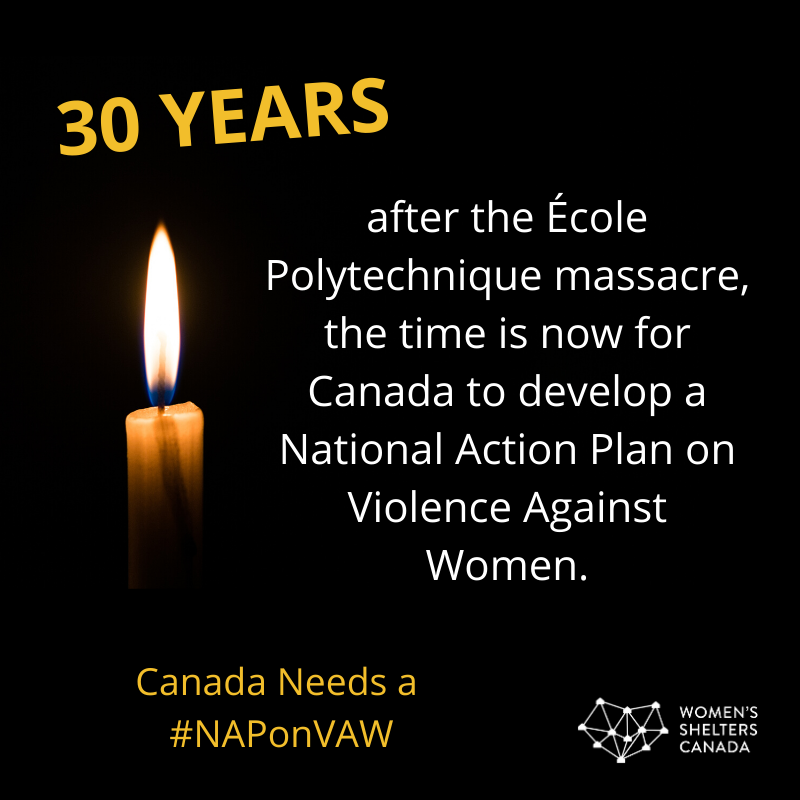 On this sad
occasion, thousands of women and their
organizations are reiterating their agenda for the elimination of
violence against women and for a public authority that takes up
its social responsibility and guarantees the rights of all. The
12 Days of Action to End Violence Against Women was launched in
Quebec on November 25, International Day for the Elimination of
Violence Against Women, as was the 16 Days of Action
internationally from November 25 to December 10.
On this sad
occasion, thousands of women and their
organizations are reiterating their agenda for the elimination of
violence against women and for a public authority that takes up
its social responsibility and guarantees the rights of all. The
12 Days of Action to End Violence Against Women was launched in
Quebec on November 25, International Day for the Elimination of
Violence Against Women, as was the 16 Days of Action
internationally from November 25 to December 10.
Neo-liberal governance in Canada is doing everything it can to ensure that the movement remains within the limits of a "reasonable" and "behavioural" opposition, one that does not tackle the issue of the violent and anti-social direction of the economy. Prime Minister Justin Trudeau expressed this clearly again on November 25 when he said, "Today, as we launch the 16 Days of Activism Against Gender-Based Violence, I invite Canadians to reflect on what we can all do -- through our words and actions -- to end gender-based violence and create a brighter future for everyone." This is liberal hypocrisy at its worst and an insult to women.
The government's litany concerning good or bad behaviour exposes its hypocrisy, as each and every day it targets the dignity of women and their working and living conditions. The anti-social policy of government is not a problem of behaviour, nor is its policy of foreign interference and aggression, nor, for that matter, is its racist and colonialist policy towards Indigenous women and their communities. Violence against women and children is intimately linked to the anti-social and warmongering direction of the society and today's destruction of arrangements and institutions that no longer function.
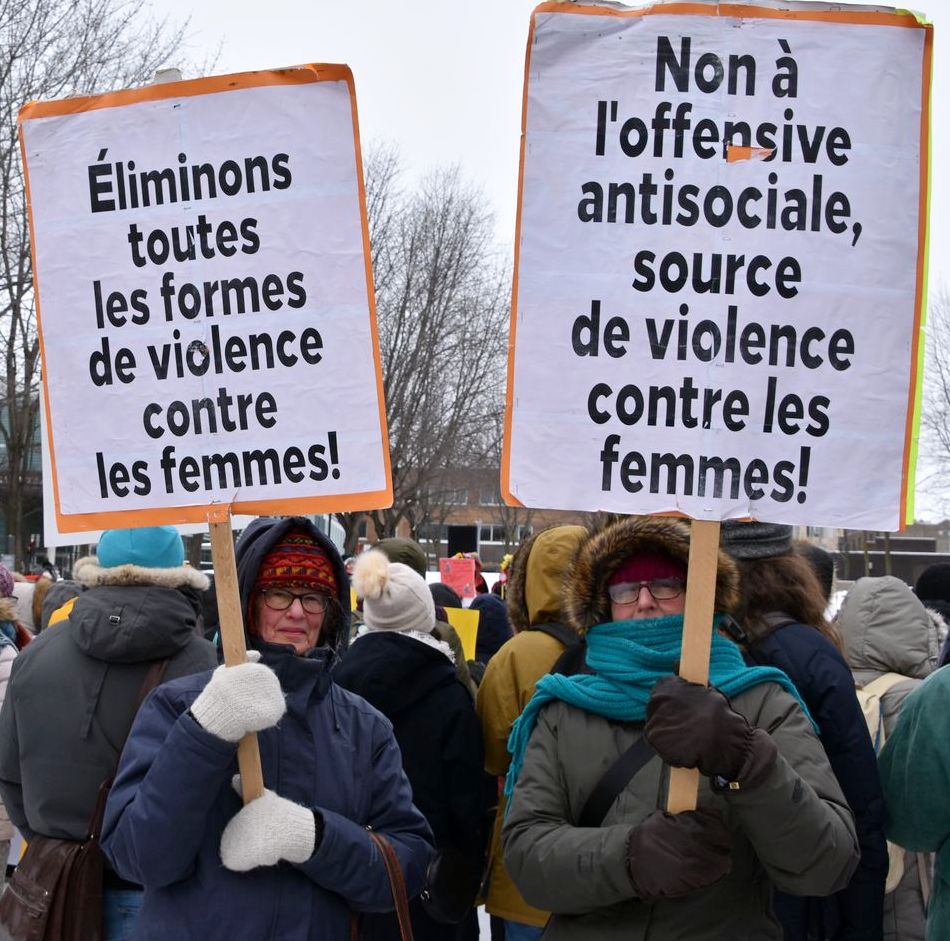 The
women's movement and
its consciousness are far more advanced than what the Trudeau
government is expressing. They want to decide, to humanize the
society. The demands of women are responding with their own claims for
massive investments in
health care, education and social programs, for organizations working
in
defence of women's rights and for shelters. Indigenous women are
fighting to end the permanent violence inflicted on women and
Indigenous peoples. Since the beginning of the National
Inquiry into Missing and Murdered Indigenous Women and Girls, on
September 1, 2016, more than 130 Indigenous women have been
murdered, or have died under circumstances
considered suspect. They have been struggling for close to 200
years for their hereditary rights -- their right to be -- which are
denied to such an extent that Canada is being called upon by the
United Nations to put an end to its colonial legacy and address
the root of the problem. What must also be addressed is that Muslim
women in particular are being targeted by the Legault
government's Bill 21. Women are not interested in simply decreasing the
amount of violence they face and refuse to have the issue reduced to a
question of behaviour. They want to eliminate it.
The
women's movement and
its consciousness are far more advanced than what the Trudeau
government is expressing. They want to decide, to humanize the
society. The demands of women are responding with their own claims for
massive investments in
health care, education and social programs, for organizations working
in
defence of women's rights and for shelters. Indigenous women are
fighting to end the permanent violence inflicted on women and
Indigenous peoples. Since the beginning of the National
Inquiry into Missing and Murdered Indigenous Women and Girls, on
September 1, 2016, more than 130 Indigenous women have been
murdered, or have died under circumstances
considered suspect. They have been struggling for close to 200
years for their hereditary rights -- their right to be -- which are
denied to such an extent that Canada is being called upon by the
United Nations to put an end to its colonial legacy and address
the root of the problem. What must also be addressed is that Muslim
women in particular are being targeted by the Legault
government's Bill 21. Women are not interested in simply decreasing the
amount of violence they face and refuse to have the issue reduced to a
question of behaviour. They want to eliminate it.
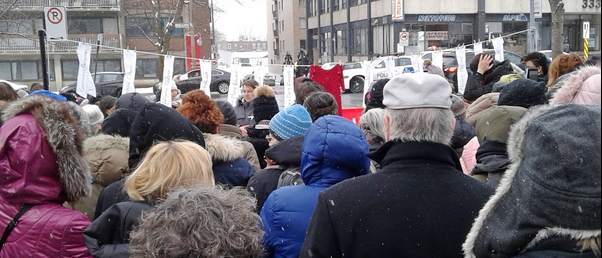
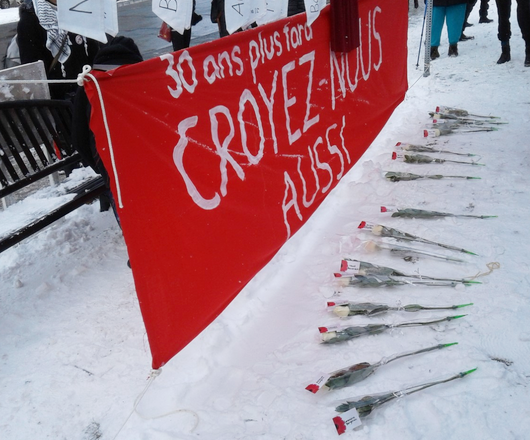
 Commemoration
in Montreal, December 6,
2019, on the occasion of the 30th
anniversary of the École Polytechnique tragedy, at Place du
6-décembre-1989 at the corner of Queen Mary Road and
Bégin Street to pay tribute to the 14 young women who were
killed: Geneviève Bergeron, Hélène
Colgan,
Nathalie Croteau, Barbara Daigneault, Anne-Marie Edward, Maude
Haviernick, Barbara Klucznik-Widajewicz, Maryse Laganière,
Maryse Leclair, Anne-Marie Lemay, Sonia Pelletier, Michèle
Richard, Annie St-Arneault and Annie Turcotte.
Commemoration
in Montreal, December 6,
2019, on the occasion of the 30th
anniversary of the École Polytechnique tragedy, at Place du
6-décembre-1989 at the corner of Queen Mary Road and
Bégin Street to pay tribute to the 14 young women who were
killed: Geneviève Bergeron, Hélène
Colgan,
Nathalie Croteau, Barbara Daigneault, Anne-Marie Edward, Maude
Haviernick, Barbara Klucznik-Widajewicz, Maryse Laganière,
Maryse Leclair, Anne-Marie Lemay, Sonia Pelletier, Michèle
Richard, Annie St-Arneault and Annie Turcotte.
Canadian foreign policy is rife with aggressions committed in the name of high ideals. Canada's support for the repressive and corrupt government of Haiti, its interference in the internal affairs of Venezuela, its support for the political destabilization of Bolivia, and its refusal to condemn wide-scale repression in Chile are all "words and actions" that permit violence to be committed against women.
The struggle being waged by women and girls for the affirmation of their rights and for an end to all forms of violence against them is heroic, courageous and inspiring. It is heroic and courageous because it is being waged within the context of the political, social, cultural and economic degeneration of the society. That degeneration has reached such a level that far from violence being eliminated, it is occurring on an unprecedented scale in all spheres of society and is preventing society itself from moving forward.
Within such conditions, it is a real tribute to
women that on
this 30th anniversary of the tragedy at École Polytechnique,
they
reiterate their demand for the elimination of all forms of
violence committed against them and children. It is to their
honour that they are demanding an end to violence in all its
forms. Today more than ever, the humanization of the natural and social
environment is the order of the day.


University of British Columbia, December 6, 2019.
(Photos: TML, A. Funduk, Women's Shelters Canada, T. Williams)
Origin of the International Campaign for the Elimination of Violence Against Women and Girls

March of Butterflies for the elimination of violence against women,
Santo Domingo,
Dominican Republic, November 24, 2019.
November 25 was proclaimed the International Day for the Elimination of Violence Against Women by the UN on December 17, 1999. This year marks the 20th anniversary of that date, the starting point of a 16-day international action campaign to put an end to violence against women.

Marchers carry photos of the Mirabal sisters in 2019 March of Butterflies. |
The date was chosen to honour the memory of Minerva, Patria and Maria Teresa Mirabal, three young sisters in the Dominican Republic who were assassinated on November 25, 1960. The three sisters were active militants and organizers against the bloody dictatorship of Rafael Trujillo. He had been brought to power with the help of the United States in 1930 and was well known for the persecution and assassination of persons or collectives opposed to his governance. He was also renowned for having ordered the execution of tens of thousands of Haitians working in the Dominican Republic in 1937. The Mirabal sisters and their husbands mobilized and organized to try to overthrow the dictatorship. On November 25, 1960, following their release from prison and as they travelled to visit their spouses, who were also jailed, their car was intercepted and they and their driver were beaten to death. The bodies were put back into the car, which was then pushed into a ravine to make it look like a road accident.

1960 photo of the Mirabal sisters.
November 25 is a date that exemplifies state violence against women fighting for their rights. In 1993, the United Nations General Assembly, in its Declaration on the Elimination of Violence Against Women, defined violence towards women in the following manner:
"For the purposes of this Declaration, the term 'violence against women' means any act of gender-based violence that results in, or is likely to result in, physical, sexual or psychological harm or suffering to women, including threats of such acts, coercion or arbitrary deprivation of liberty, whether occurring in public or in private life."
Article 2 of the Declaration notes that violence against women may occur in the family, within the general community (workplace, educational institutions, etc.) or be perpetrated by the state.
For the past 10 years, the International Day for the Elimination of Violence Against Women has been followed by a 16-day action campaign that ends on December 10, International Human Rights Day. In Quebec, the campaign lasts 12 days and ends on December 6, to honour the memory of the 14 young students at École Polytechnique in Montreal who were murdered because they were women. Since 1991, Canada-wide, December 6 is the National Day of Remembrance and Action on Violence Against Women. This year marks the 30th anniversary of this tragedy and on this occasion, women and their organizations are summing up the advances they have made.
In Quebec, the 12 days were marked by over 50
actions organized
from Gatineau to Mont-Joli. Through films, discussions, theatre
plays, open mics, marches and vigils, women are tackling the
forms of abuse they suffer: jailed migrants, violence against
women with a handicap, violence at the workplace or at home,
racism and poverty, the colonialist violence of the Canadian state
towards Indigenous peoples, etc. They are taking up their social
responsibility by denouncing the indignities suffered and are
declaring that a government fit to govern must take concrete
measures to permanently end that violence.
(Photos: Listin Diario, Notas Argentina)
Dominica
People Foil Blatant U.S. Interference in General Election Using Organization of American States
In a statement which many would consider cynical the United States' Department of State congratulated the island of Dominica in the Caribbean on the results of that country's December 6 general election which sees Roosevelt Skerrit continue as Prime Minister of a Dominica Labour Party government.
A media release dated December 9 stated the intention of the United States government to "continue to work with the Skerrit Administration to promote regional security, economic prosperity, electoral reform that ensures free and fair and transparent elections and the right of citizens to peacefully exercise their civic duty." The statement also thanked the Organization of American States (OAS), the Commonwealth and the CARICOM Electoral Observer Missions for their work in ensuring transparency in the democratic process.
|
|
Following unsuccessful legal attempts to postpone the election while at the same time fielding candidates in each constituency, the opposition United Workers Party (UWP), led by Lennox Linton, won three of the 21 seats in the House of Assembly and Senate, with the Dominica Labour Party winning the remaining 18. All three Electoral Observer Missions endorsed the validity of the elections, identifying no major problems with the process.
The island of 75,000 people has witnessed violence and tension over the last few weeks as the Opposition UWP, alongside civil society groups, which many believe are inspired, advised and organized by the OAS, questioned the validity of the electoral process. They announced in advance their intention to reject the results of the general election, and criticized the government, including commenting to the effect that the Prime Minister would experience a fate similar to that of Bolivia's Evo Morales. The spokesperson added that the UWP would gladly accept the help of the OAS to achieve its goal. The tension evolved into violence and disturbances prior to the December 6 elections, considered to have been provoked by Linton's inflammatory words and the incitement of his supporters during demonstrations to voice these sentiments.
In advance of the elections, in an appeal to CARICOM, individual Caribbean governments, political parties, religious and social organizations and individuals the Caribbean Anti-Imperialist Network commented that the statements attributed to the Opposition present a danger to peace in Dominica and to the safety and security of Dominicans, adding that if those who have outlined such aims are allowed to continue, there is a serious danger of bloodshed and loss of life in Dominica.
Alluding to the activities of the OAS in Dominica and highlighting its history in undermining democratic governance in the region -- organizing coups, backing racist forces and acting as an instrument for U.S.-organized regime-change schemes -- the statement condemned the destructive interference of that organization, which has been making brazen demands of Dominica with regard to its election.
Speaking after the elections, Prime Minister Skerrit said that "the elections are over now. The UWP failed to delay them, they failed to cause chaos in our society and they have failed in the ballot boxes." In speaking of the Opposition, Prime Minister Skerrit said, "I call to the UWP and its supporters to hold their conduct and behaviour of the last few weeks, concede the election and work for peace" and reiterated his call to "give this country full assurance that the Dominica Labour Party is fully committed to building peace and unity."
The Prime Minister also said that the government will continue to build a country with determination and respect for its people, working for policies that strengthen mainly housing, education and health projects.
In contrast, the leader of the Opposition has since reiterated his party's rejection of the election results, defining them as electoral fraud, demanding new elections, rebutting the findings of the Electoral Observer Missions and calling on the country to rise up. To this end, Linton called his supporters to the capital city Roseau, for what he dubbed a thank you meeting on December 12.
Now that the dust has settled, Dominica can continue to rebuild after the effects of the 2017 hurricane, deal with the inflammatory situation incited by the OAS and other forces, and attempt to solve their day-to-day problems in an atmosphere of calm. It is clear though that the OAS caravan of destabilization will remain there and probably continue its tour throughout the region.
Given this continued tension, vigilance is important, as is summing up the recent experiences of Cuba, Jamaica, Grenada, Nicaragua and Venezuela. Caribbean sovereignty is the most important thing, especially giving it real substance through empowerment of the peoples. That will be the starting point of the defence.
Voting in the December 6 election.
(With files from TML correspondent and Caribbean Anti-Imperialist Network. Photos: TeleSUR, Barricada)
(To access articles individually click on the black headline.)
Website: www.cpcml.ca Email: editor@cpcml.ca
